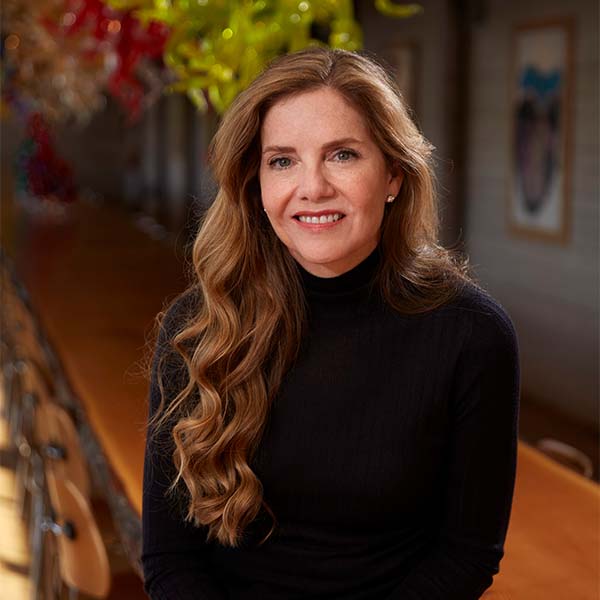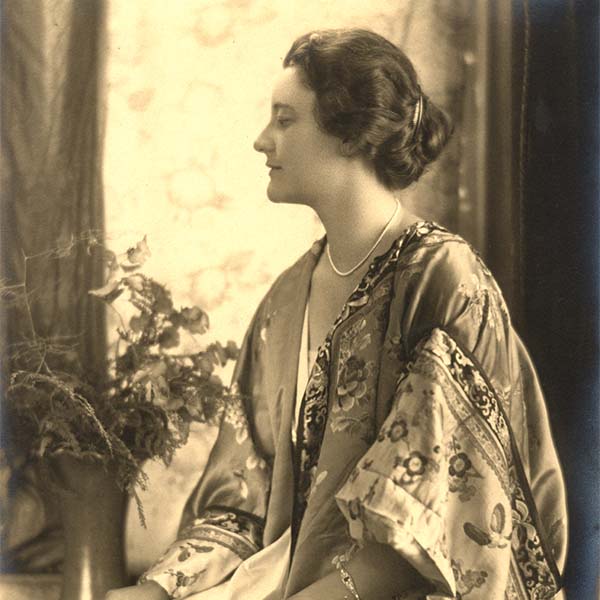All month long, the Garden is celebrating Women’s History Month by spotlighting four iconic women, both past and present, that have shaped the Garden through philanthropy, exhibition, education and horticulture.
This week, learn more about Leslie Chihuly, President and CEO of Chihuly Studio, and Garden founding member Lou Ella Archer.

Leslie Chihuly
Leslie Chihuly is President and CEO of Chihuly Studio, the Seattle-based organization which features the work and vision of her husband Dale Chihuly. The organization’s latest exhibition Chihuly in the Desert is on display at Desert Botanical Garden, for its third time, and Frank Lloyd Wright’s Taliesin West through June 19.
Here are five things to know about Leslie Chihuly:
1. She’s passionate about music.
Leslie began studying the flute and piano at 5-years-old and actively plays today. Continuing her musical passion, she’s been instrumental at the Seattle Symphony Orchestra, for which she has served as Chairman of the Board for nine years. She guided the organization through the transitional period with the replacement of a long-time musical director. Under Leslie’s leadership, she helped the organization rethink how the orchestra marketed itself to the community, raised money to get it out of debt and build the endowment, and oversaw the recruitment of executive directors.
As a graduate of Vassar College and has served on the board since 2017. She also serves on the board of Pilchuck Glass School, which was founded by her husband Dale in 1971, along with patrons Anne Gould Hauberg and John H. Hauberg. She has served since 2000.
3. She’s a mental health advocate
4. She co-founded the Dale and Leslie Chihuly Foundation
5. The first project she managed at Chihuly Studio was the groundbreaking “Chihuly Over Venice” exhibition
Under Leslie’s leadership, this ambitious project took shape in 1995 where a team of glassblowers visited glass factories in Finland, Ireland, Mexico and Italy. Chihuly partnered with local art masters in these communities and experimented and created a new vocabulary and forms. The culmination of the project was 15 ‘Chandeliers,’ which were exhibited throughout Italy.

Lou Ella Archer
From the very beginning, founding member Lou Ella Archer generously and enthusiastically supported the Garden. Born in St. Paul, Minnesota, in 1891, Lou Ella spent winters in Phoenix where she attended elementary and high school. Passionate about conserving the desert, she joined others in the 1930s to form the Arizona Cactus and Native Flora Society. From its onset, the Society’s goal was to save a stretch of desert by creating a botanical garden. Over four decades, Lou Ella Archer would become one of the most significant and generous supporters of Desert Botanical Garden.
Here are five things to know about Archer:
1. Home and family
Her childhood home in Phoenix was known at the time as a landmark. Palm Villa was a 20-acre estate built by her uncle at what is now the northeast corner of Central Avenue and Thomas Road. When Archer was 11-years-old, her father George Archer founded a small company that eventually grew into the mega agricultural processing company Archer-Daniels-Midland, commonly known as ADM.
2. Service to the Community
During World War II and throughout her life, Archer generously supported many humanitarian endeavors. She opened her home to student pilots, who were training in central Arizona, served as chairman of the Red Cross and helped the Phoenix Center for the Blind. Her love of animals, especially dogs, led to funding construction of a local shelter and serving on the Humane Society’s board. She also worked with the local charity Friendly House, which provided assistance to new U.S. immigrants.
3. Saving the Garden
Archer’s most critical contribution to the Garden came in 1947 after the death of founder Gertrude Webster. After the war, there were only 19 remaining members and the Garden’s future looked bleak. Webster’s will would provide enough funding to save the Garden, but only if there were 200 paid members. News of the stipulation prompted Archer to create a special Benefactor’s Membership, which she paid 75 of the memberships herself and enrolled two friends to do the same. Without the commitment and generosity of Archer, it’s possible the Garden would not exist today.
4. Character and dedication
The editor of the Garden’s first newsletter described Archer as “a woman of great energy and hard-headed executive ability.” His words could not have been more accurate. For 20 years, from 1947 to 1967, Archer held the top two positions on the Garden’s Board of Trustees. She served as president for the last 10 years of her life.
5. Her support continues on
Throughout her life, Archer funded many essential Garden improvements such as the first air conditioner, roof repairs and construction of a building that now bears her name. Before her death in 1968, she arranged a trust to support several of her dear friends for the remainder of their lives and allowed for continued support of the Garden. In 2005, 37 years after her death, Archer’s estate provided for much-needed equipment and Garden upgrades. Archer’s legacy and her significant contributions to the endowment, continue to support the Garden and its programs, today and into the future.
